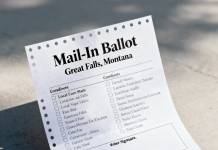Court rules in favor of the Montana Public Service Commission — A recent court decision in Missoula has sided with the Montana Public Service Commission (PSC) in a legal challenge regarding a climate petition. This ruling pertains to a motion that was filed to compel the PSC to make a decision on whether to incorporate climate change considerations into its regulatory processes for utilities, specifically around the application of a social cost of greenhouse gas emissions.
Over 40 groups, including environmental organizations and businesses, had petitioned the PSC in February to consider the impacts of climate change in its decision-making, particularly in utility rate settings and resource planning.
This followed a significant court decision in the case of Held v. Montana, where a judge ruled that the state had violated the constitutional rights of young Montanans to a clean and healthful environment by not adequately considering climate change in its policies.
When the PSC did not respond within the expected time frame, some of these groups sought judicial intervention, arguing that under Montana’s Administrative Procedure Act (MAPA), the PSC was required to either deny the petition or initiate rule making within 60 days. They claimed the delay was unlawful.
A district judge in Missoula, Leslie Halligan, a Gov. Steve Bullock appointee, dismissed the motion for a writ of mandamus. The judge’s reasoning included the argument that the PSC’s approach to considering broad public interests and allowing extensive public participation was in line with the spirit of MAPA. This decision essentially allows the PSC more time or discretion in how it addresses the petition without immediate judicial compulsion.
This ruling might be seen as a setback for those advocating for swift action on climate considerations in utility regulations. However, it doesn’t necessarily close the door on the petition itself but rather on the method of forcing an immediate decision through the courts. The PSC could still decide to incorporate climate change into its regulatory framework, but the timeline and process for this remain under its control.
Given the context, reactions might vary widely. Environmental groups and climate activists might view this as a delay tactic by the PSC, potentially influenced by political or economic interests favoring traditional energy sources. Conversely, supporters of the PSC’s decision might argue it allows for more thoughtful consideration of complex issues, ensuring that any new rules are well-considered and broadly supported.
While this court decision has resolved one aspect of the challenge, the underlying issue of integrating climate change into utility regulations remains open. The PSC might now proceed with its own timeline, potentially engaging in further public consultations or studies before deciding on rule changes.
Notes
This case underscores the ongoing tension between immediate climate action demands and the procedural pace of regulatory bodies, reflecting broader debates about environmental policy, governance, and the role of the judiciary in administrative law.







